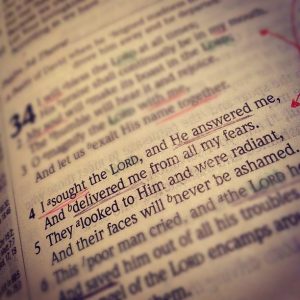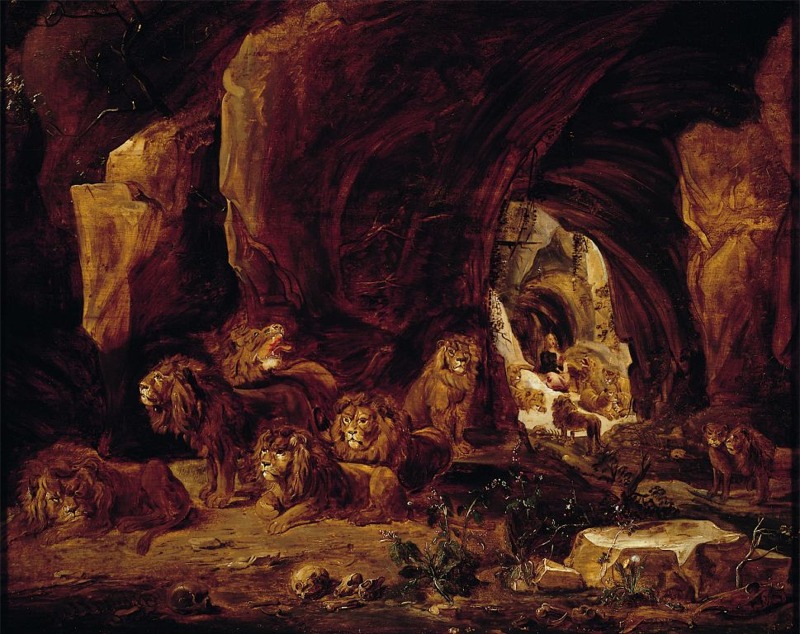There is no person who has ever read the bible that does not know about David. We’ve all read about his confrontation with wild animals, his victory over Goliath or his tryst with Bathsheba. However, few people remember that he once pretended to be mad in order to escape being put to death by a king other than Saul. [1]1 Samuel 21:10-15 and 1 Samuel 22:1

It’s what David did with that experience that forms the crux of this write-up. So let’s move on to Psalms 34. This song was written by David after he fled from King Achish, the king who would have killed him had he not pretended to be mad. If you are like me, you would wonder how and why David penned a psalm of praise just after escaping death by such an embarrassing means. It’s not like God came down with mighty thundering and an army of archangels to whisk David out of Achish’s hands. Neither was there a great slaughter of the enemy, leaving silver and gold for David and his men to plunder.
Despite having to feign madness to survive, David still praised God!
Nope, none of that. Instead, this is a man who had been anointed king many years ago and was yet to see that anointing come to fruition; a man on the run from King Saul; and for emphasis a man who had to pretend to be insane in order to escape death. And still David praised. Somehow, some way he was able to find something to thank God for. This psalm provides insight into the character of David and the measure of respect he had for God and His decisions (to act or not to act). Now that is a relationship.
The song is divided into two parts: (a) thanksgiving and (b) exhortation on the fear of the Lord. Both are inextricably linked as he says in v7 “that the angel of the Lord encampeth round about them that fear Him, and delivereth them” and in v9 “there is no want for those that fear the Lord.” It goes therefore, that David was thanking God for deliverance from Achish & tying God’s grace, deliverance & mercy to a response/reaction to fearing Him.
Part One – Thanksgiving & The Purpose of Testimony
I imagine that if it were me, I would first berate God for letting me go through such an embarrassing situation before grudgingly thanking Him that I was still alive. Not David. In fact, he doesn’t stop at just acknowledging God’s grace and thanking Him for it. David decides to bring others into this awesome circle of fellowship & exhorts /teaches on how to get there. This awesome man decided to see his experience as an avenue through which he could be a blessing to someone else.
There are times we go though the most painful and emotionally scarring experiences and we wonder why. Well, we can take a cue from David’s book. We can choose to see these hard experiences as learning opportunities, because more often than not, the lessons we learn will be useful in helping someone else through a harrowing period of their lives.
What then did David learn and what did he seek to teach?
Part Two – Fear of the Lord according to David?
If we were to look at David’s acts or deeds we will be quick to label him imperfect, but we cannot deny that he had a special relationship with God. So any lesson he teaches on fostering that relationship should be heeded.
- Be Good v1 & 13
Keeping the tongue from evil is very important to God. In Proverbs 6:16-18, 7 things are listed that God hates. Of the 7, 3 have to do with the tongue and its effects.
David advises that we keep our tongues from speaking evil. Why? [2]Matt 12:34-37; Matt 15:10-11; Matthew 15:16-20 Because, what comes out of your mouth is a reflection of what is inside your heart. [3]James 1:26 There is a connection between what is inside of man and what comes out of man. So David says keep your insides clean so that what comes out of your mouth is clean. [4]See advice of Paul in Ephesians 4:23-19 on learning to tame the tongue and the advice of James in James 3:3-5
- Do Good & Seek Peace v14
In addition to being good, we should actively depart from doing evil and actively do good. Like James puts it, your religion is all in vain if you fail to do anything good, if you fail to show kindness. [5]James 1:27 and James 2:14-18 Jesus also made reference to this in Matthew 25: 31-46, and he laid emphasis on the importance of showing kindness to those who need it the most. The essence of Christianity is to influence the world positively and spread the love of Christ to those who would ordinarily not feel this love. David is just giving us a gentle reminder
David also mentions the importance of seeking peace. This is a man plagued with war and bloodshed, but he understood that seeking peace and walking in peace was very important. During his sermon on the mount, Jesus taught on turning the other cheek and letting go of offence [6]Matthew 5:21-26 and Matthew 5:38-48 all in a bid to keep peace. Peacemakers have also been described as ‘blessed’ [7]Matthew 5:9 and this was hundreds of years after David made his appeal for seeking peace. [8]Hebrews 12:14
A biblical example of one who sought peace was Abraham and how he dealt with potential conflict with his nephew Lot. [9]Gen 13:1-11 For the sake of peace, Abraham gave up his right to choose first and to choose better; and he was blessed by God with land including that which he gave up.
Contrary to contemporary, name it and claim it, Christian theology, David counsels those walking in the fear of God to “expect” afflictions, hatred and times of crying.
From David’s experience, he teaches that the combination of being good and doing good is the ultimate manifestation of the fear of the Lord. [10]See Micah 6:8 and Proverbs 8:13 We may & will not get it right all the time (much like David) but if we seek God & walk with Him by being better people and helping others; it is walking in the fear of God.
Contrary to contemporary, name it and claim it, Christian theology, David counsels those walking in the fear of God to “expect” afflictions, hatred and times of crying. Nonetheless, our comfort is that God will be with us through it all and bring us to the other side. [11]Psalm 34:15, 17, 19-21. See also Proverbs 24:16; John 15:18-25; John 16:33 So that, like David, when faced with trying times and God takes us through, we remember to thank Him for it; AND teach others of the lessons we have learned through such experiences.
David demonstrates how a testimony of God’s goodness should read – praising God & teaching God, even when the going gets tough. For the sake of peace and ultimately, for the sake of heaven.
References
| ↑1 | 1 Samuel 21:10-15 and 1 Samuel 22:1 |
|---|---|
| ↑2 | Matt 12:34-37; Matt 15:10-11; Matthew 15:16-20 |
| ↑3 | James 1:26 |
| ↑4 | See advice of Paul in Ephesians 4:23-19 on learning to tame the tongue and the advice of James in James 3:3-5 |
| ↑5 | James 1:27 and James 2:14-18 |
| ↑6 | Matthew 5:21-26 and Matthew 5:38-48 |
| ↑7 | Matthew 5:9 |
| ↑8 | Hebrews 12:14 |
| ↑9 | Gen 13:1-11 |
| ↑10 | See Micah 6:8 and Proverbs 8:13 |
| ↑11 | Psalm 34:15, 17, 19-21. See also Proverbs 24:16; John 15:18-25; John 16:33 |


